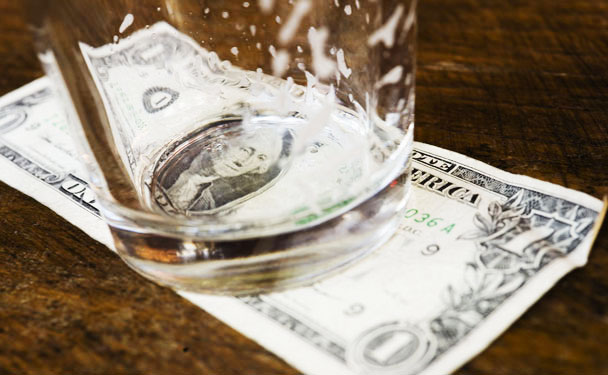Jamie Berg, an engineer way up in Portland, Maine, visits bars once or twice a week to savor a few Pabst Blue Ribbon 16-ouncers. He pays a couple bucks per beer, easy as pie. But things grow thorny when he counts his change and considers a tip.
“If it’s a nice place, well kept, with attentive bartenders and the Pabst are nice and cold, tipping $1 is about right,” says Berg, 26. “But if the bartender takes a while, the place is dumpy and I get change in the form of coins, they are getting the coins.”
For safety’s sake, he better pray he never tosses a quarter to Sam Ross.
“If your tip makes a clink on the bar, even if it’s dollar coins, you’ll get it thrown at the back of your head,” says Ross, a mixologist for New York City’s esteemed Little Branch and L.A. hot spots Sona and Comme Ça. “Under no circumstances should you leave less than a dollar bill.”
Then again, a little change is sometimes welcomed.
“Coins are legal tender. I like to apologize if I leave change, but it’s not so bad to leave it at the beginning of the night,” says Eben Klemm, a molecular biologist turned drink innovator for the B.R. Guest restaurant group. “At the end of the night, though, change will make bartenders sad: No one wants to count change.”
Tipping is the subject of passionate, conflicting and downright arbitrary opinions among bargoers and ‘tenders alike. While restaurant compensation is straightforward (15 to 20 percent), bars lack simple guidelines. A Budweiser may deserve a buck, but that dollar is a measly gratuity on a precisely calibrated old-fashioned. Should boozers gauge tips on service speed? Drink quality? Quantity? Cost? Can you stiff a surly bartender opening a Milwaukee’s Best can?
“That’s crap,” says Ryan Magarian, a cocktail and spirits service consultant in Portland, Oregon. “Entering a bar is not like going to a grocery store and picking up a six-pack. You’re paying for that person’s time.”
Big deal, counters Kari Scott of Boulder, Colorado. “It’s perfectly fine not to tip. It’s your money,” says the artist and baker, 38. “Not tipping a bartender is not the same as not tipping a waiter or waitress. It’s a whole different realm.”
Ancient barflies may concur. “Tipping in bars wasn’t done until Prohibition,” says cocktail historian David Wondrich, author of Imbibe! (Perigee 2007). “You paid your drink. End of transaction. In America you didn’t tip; people only tipped in England.” There’s no smoking-gun moment when American tipplers started leaving gratuities, Wondrich says, but his speculation centers on bootleg liquor’s crummy quality.




 Pinterest
Pinterest


